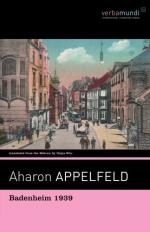|
This section contains 935 words (approx. 4 pages at 300 words per page) |

|
The imaginative literature of the Holocaust seeks to imagine the unimaginable, and artistic failure is therefore a condition of its enterprise. Indeed, the reality is so monstrous that artistic success might well have the effect of blasphemy, its order and harmony an affront to what we know from reason and experience: the horror of deaths in numbers beyond reckoning, of chaos yoked to efficiency. Which should not at all be taken to mean that art can escape the responsibility of attempting a task which would seem to be, by definition, incapable of fulfillment.
Art will always find strategies, partial successes, failures which authenticate their intentions. The strategy employed by Aharon Appelfeld, an Israeli novelist whose own childhood was grievously assaulted by the Holocaust, is an extraordinarily daring one, and it has produced a short novel [Badenheim 1939] that is elegant, resonant and deeply disturbing. Its power to shock is...
|
This section contains 935 words (approx. 4 pages at 300 words per page) |

|


